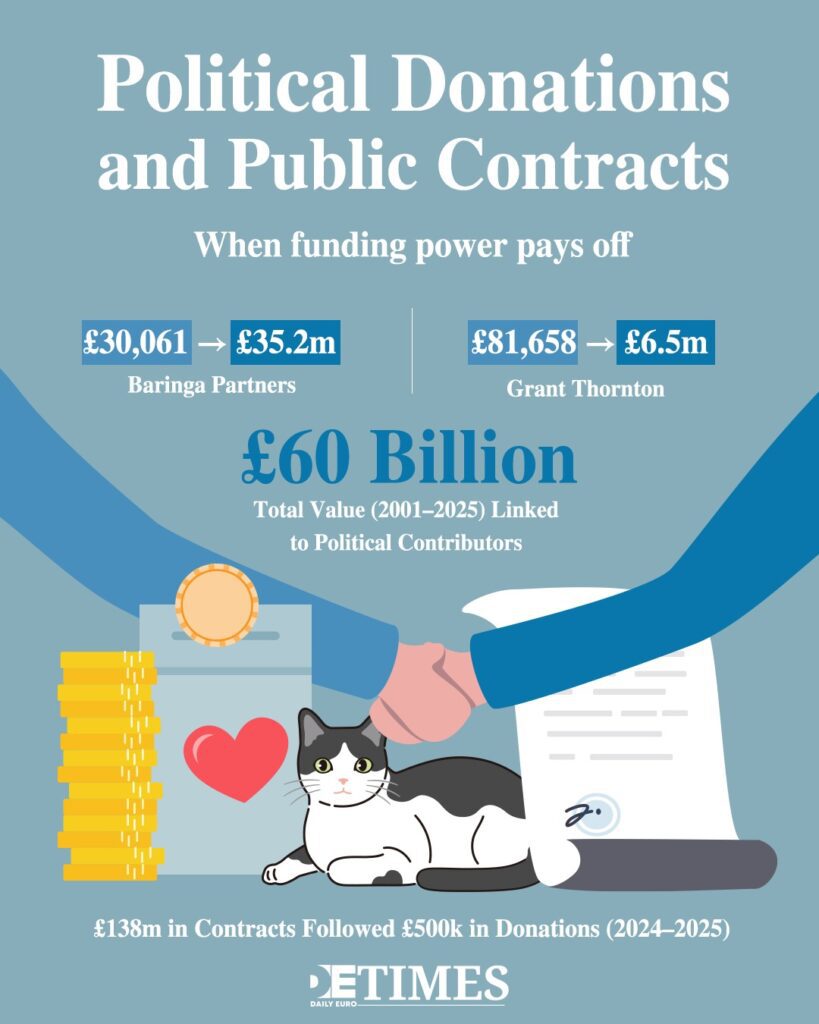In their first year in government, the Labour party saw eight companies donate over half a million pounds and then receive £138 million in contracts.
The transactions occurred between July 2024 and June 2025. Labour ministers now preside over the familiar practices.
As an example, Baringa Partners gave Labour £30,061 in January 2024, and the consultancy firm secured £35.2 million in government work afterwards. Similarly, Grant Thornton transferred £81,658 between March 2023 and July 2024 and received £6.5 million in contracts.
The arrangement is also maintained by four of Britain’s 39 strategic suppliers, firms the public sector depends on: Fujitsu, KPMG, Microsoft, and PwC.
A Cross-Party Practice
The Autonomy Institute examined 373 companies over recent years, finding the firms generated over £60 billion from public contracts after making political contributions.
Conservative-linked companies collected £25.4 billion since 2001, much of it through pandemic deals with firms like Randox Laboratories and Globus Shetland. In the same period, Labour-connected businesses accumulated £796 million.
Tellingly, two companies, Microsoft and PwC, managed to maintain the arrangement with both parties. Dr Susan Hawley from Spotlight on Corruption warns of the underlying implications. She states that privileged access to power translates directly into privileged access to taxpayer money.

A System Open to Corporate Power
Britain’s system operates without common international safeguards. Westminster operates differently. The rules on lobbying are also weak.
The official Register of Consultant Lobbyists covers only about four per cent of lobbying activity. In-house corporate lobbyists escape registration requirements completely.
The environment allows public service and private power to blur. Dr Will Stronge describes how the lines disappear as the same corporations fund parties and win their contracts.
A revolving door sees personnel move between government and the private sector. At times, the individuals make decisions guided by their corporate loyalties.
The process is so advanced that academic research from the London School of Economics identifies corporate state capture taking root in Britain’s governing structures.
The High Price of Outsourcing
The public sector spent around £187 billion on goods and services through the arrangement, which generates an £82 billion annual market. The method often leads to higher costs and poor performance.
Research by Unison documented £9 billion in cost overruns on only 105 outsourced IT contracts. Performance also suffers.
Serco pocketed up to £165 million from coronavirus contracts while its chief executive earned £4.5 million. Its contact tracing system’s 67 per cent effectiveness lagged far behind the public sector’s results.
To maximize returns, private companies cut corners. Research from Oxford University found that outsourced care for vulnerable children prioritizes firm cost-cutting, sending more of them across the country away from their families.
Hollowing Out the State
The government also loses skills and knowledge each time it outsources decisions. In their book The Big Con, Mariana Mazzucato and Rosie Collington state that consultancies hollow out state capacity.
The escalating outsourcing diminishes the state’s internal knowledge.
Functions once considered inherently public get carved out and served to private corporations through shared services and contracting.
Potential Fixes for a Porous System
Several fixes have been proposed to address the systematic problems.
The Autonomy Institute recommends barring any company that made a political donation in the previous decade from public contracts. The Institute also calls for more transparency for all donations over £500, with company numbers published alongside donor details, and for strengthening procurement transparency.
Dr Hawley states that the perception of privileged access is very damaging to public trust. Hawley believes companies and directors who receive public contracts should face real consideration of a ban on making political donations.
The House Stands for Sale
The current situation points to grave problems with how Britain handles conflicts of interest. Britain’s polity is exceptionally porous to business interests.
People notice the smell. Two-thirds of UK adults feel the public should know more about lobbyists. Trust drains from political institutions where transparency is absent.
Chris Hinchliff, Member of Parliament for North East Hertfordshire, observes how wealth equals power in Britain. Big firms give money for access, and research implies they get paid back in spades.
The growing power and wealth of billionaires and mega-corporations seemingly coincide with increasing hardship for everyone else. The apparatus of government becomes a business opportunity. The House gets bought piece by piece and each contract is another room sold.
Keep up with Daily Euro Times for more updates!
Read also:
A Match to a Flame: Reform UK and Immigration
On Catch-Up: UK Government Plans GPS ID Across Network Rail
Airbus’ Edge on Boeing is Innovation, Not Government Support






